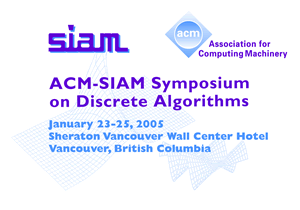
Rigorous Analysis of Heuristics for NP-hard Problems
Uriel Feige, Weizmann Institute, Israel
The known NP-hardness results imply that for many combinatorial optimization problems there are no efficient algorithms that find an optimal solution, or even a near optimal solution, on every instance. A heuristic for an NP-hard problem is a polynomial time algorithm that produces optimal or near optimal solutions on some input instances, but may fail on others. The study of heuristics involves both an algorithmic issue (the design of the heuristic algorithm) and a conceptual challenge, namely, how does one evaluate the quality of a heuristic. Current methods for evaluating heuristics include experimental evidence, hand wavingarguments, and rigorous analysis of the performance of the heuristic on some wide (in a sense that depends on the context) classes of inputs. This talk is concerned with the latter method. On the conceptual side, several frameworks that have been used in order to model the classes of inputs of interest (including random models, semi-random models, smoothed analysis) will be discussed. On the algorithmic side, several algorithmic techniques and principles of analysis that are often useful in these frameworks will be presented.